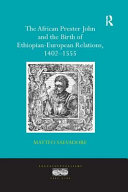
The African Prester John and the Birth of Ethiopian-European Relations 1402-1555
By - Salvadore, Matteo
Floor
-
Floor 4
ISBN 10 - 0367204517
ISBN 13 - 9780367204518
Book Status
-
5 Qnty Available with us.
Subject
-
Prester John (Legendary character)
Shelf No
-
5
Call Number
-
963 SAL
Physical Description
-
1 online resource
Notes
-
Includes Index